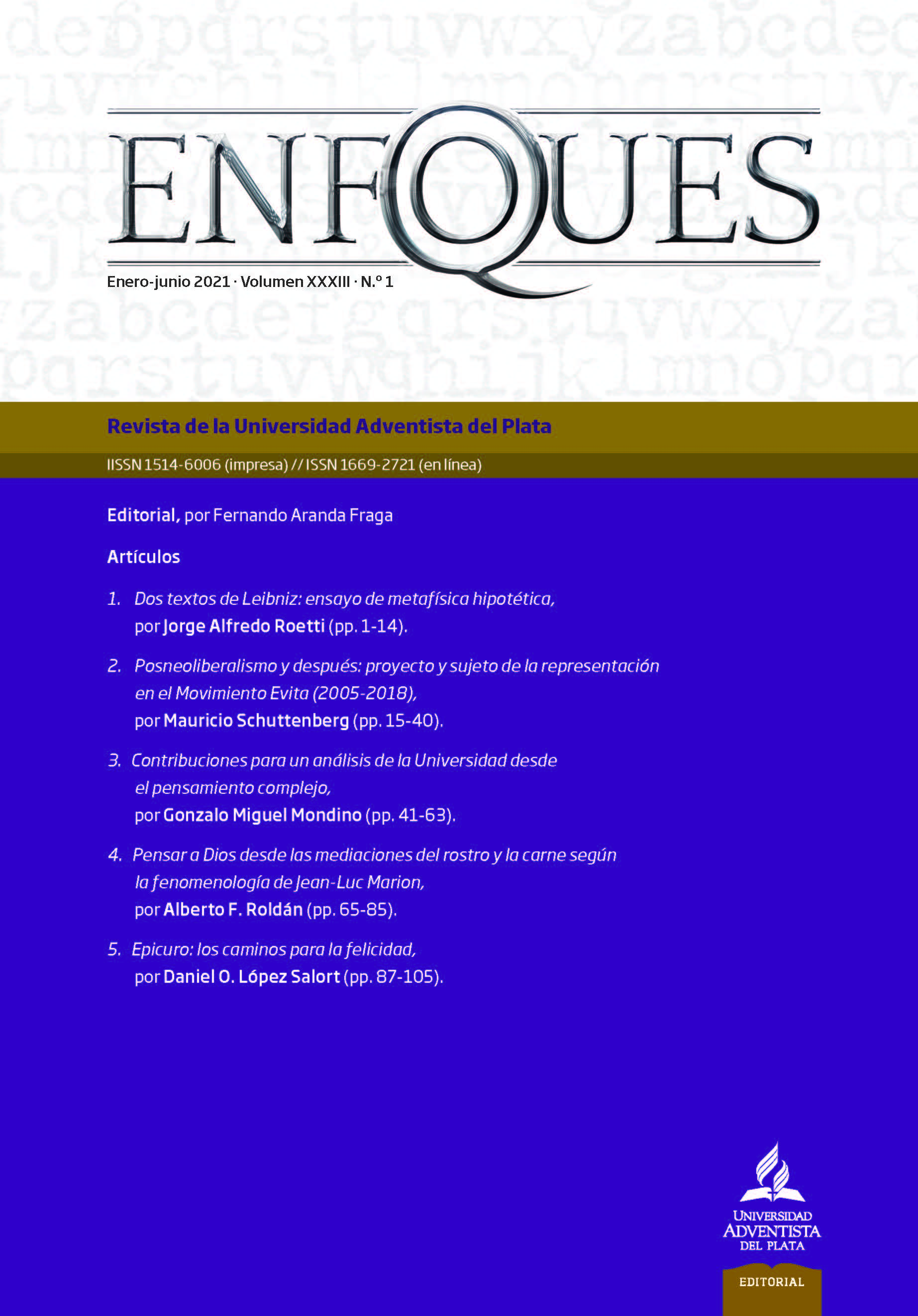Dois textos de Leibniz: ensaio sobre uma metafísica hipotética
DOI:
https://doi.org/10.56487/enfoques.v33i1.994Palavras-chave:
Leibniz, Ser, Deus, Consciência, Ateísmo dogmáticoResumo
O artigo estuda duas passagens dos Princípios da Natureza e da Graça fundados na Razão, de Leibniz, e as questões que surgem de sua primeira pergunta: Por que há algo e não, em vez disso, o nada? Estas são as questões da existência de Deus e da permanência da consciência, que não podem ser demonstradas completamente. Não obstante, aqueles que superam as tentativas de fundamentação de todo ateísmo dogmático, tão difundido no pensamento atual, alcançam fundamentos insuficientes, mas, todavia, importantes a seu favor. Esse é o resultado mais relevante deste ensaio de metafísica hipotética.Downloads
Referências
Ludwig Wittgenstein, Tractatus logico-philosophicus, edición corregida bilingüe alemán/inglés (Londres: Kegan Paul, Trench, Trubner & Co, 1922).
Martin Heidegger, “Was ist Metaphysik?”, conferencia del 24 de julio de 1929. Ver Heidegger Gesamtausgaben (Frankfurt am Main: Vittorio Klostermann, 2004), vol. 9, Wegmarken, 122.
Gottfried Wilhelm Leibniz (1714). Ver Gottfried Wilhelm Leibniz, Kleine Schriften zur Metaphysik. Opuscules Métaphysiques (Frankfurt am Main: Insel Verlag, 1965), ed. y trad. al alemán por Hans Heinz Holz, 424–426.
Según parece, fue Cicerón, si no el primero, al menos uno de los primeros, que se anticipó a Leibniz en introducir un principio de razón suficiente, al menos de índole causal, como se lee en De divinatione 2, 61: Nihil sine causa fit. La primera cuestión tampoco surge con Leibniz, ya que se desarrolla a lo largo de la historia de la filosofía (Cur Potius Aliquid Quam Nihil?). Ver para ello el libro de Daniel Schubbe, Jens Lemanski y Rico Hauswald, eds., Warum ist überhaupt etwas und nicht vielmehr nichts?: Wandel und Variationen einer Frage (Hamburg: Felix Meiner Verlag, 2013).
Los temas de la creación, la contingencia y la necesidad se tratan también en De rerum originatione radicali, tratado previo a los mencionados (es del 23 de noviembre de 1697). Podemos consultar Die philosophischen Schriften von Gottfried Wilhelm Leibniz, ed. por C. I. Gerhardt, 7 vols., 1875–1890. Ver vol. VII, 302. Hay una edición castellana: G. W. Leibniz, Escritos filosóficos, ed. por Ezequiel de Olaso (Buenos Aires: Charcas. 1982), 666.
Citado en Martin Schneider, Das Weltbild des 17. Jahrhunderts. Philosophisches Denken zwischen Reformation und Aufklärung (Darmstadt: Wissenschaftliche Buchgesellschaft, 2004), 220.
Einstein recurrió a un agregado teórico arbitrario que llamó “constante cosmológica” para negar el big bang. Más tarde se arrepintió de ello. La doctrina de la explosión originaria (big bang en inglés, Urknall en alemán) fue propuesta por el abate, astrónomo y físico belga Georges Lemâitre (1927) de la Universidad Católica de Lovaina, aunque ya antes, en 1922, fuera propuesta independientemente por el físico ruso Alexander Friedman y difundida luego, en 1948, por su discípulo ucraniano Guiorgui Gamov, físico especialista en gravedad, ambos de la Universidad de Leningrado, hoy nuevamente San Petersburgo.
Ver Jorge Alfredo Roetti, Cuestiones de fundamento (Buenos Aires: Academia Nacional de Ciencias de Buenos Aires, 2014), 302; Jorge Alfredo Roetti, Reglas y diálogos: una discusión lógica (Buenos Aires: Academia Nacional de Ciencias de Buenos Aires, 2016), e-book, 432; Jorge Alfredo Roetti y Rodrigo Moro, eds., El fundamento y sus límites: algunos problemas de fundamentación en ciencia y filosofía (Londres: College Publications, 2016), 330.
Publicado
Edição
Seção
Licença

Este trabalho está licenciado sob uma licença Creative Commons Attribution-NonCommercial-ShareAlike 4.0 International License.




